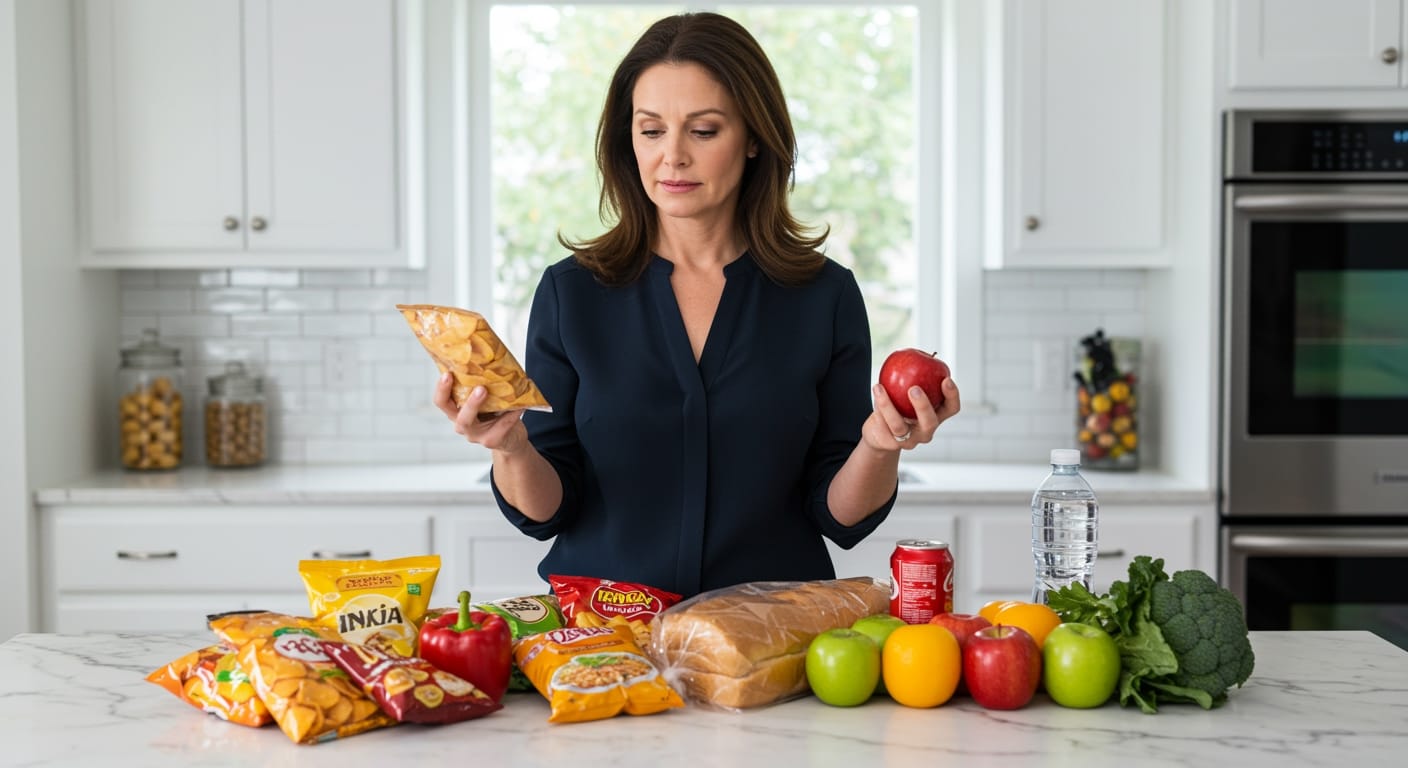✪ Key Highlight: Ultra-processed foods now comprise 73% of America’s food supply and drive chronic disease epidemic nationwide.
Introduction
Your grocery cart tells a story about your health future.
Robert F. Kennedy Jr., now serving as Health and Human Services Secretary, has declared war on ultra-processed foods that dominate American diets and fuel our chronic disease crisis.
Hi, I’m Abdur, your nutrition coach and today I’m going to analyze this groundbreaking government initiative targeting the processed food industry that profits from our poor health.
What Makes This Government Action Different?
Kennedy’s approach represents a fundamental shift in how government addresses food policy.
The “Make America Healthy Again” commission released its first report in May, revealing that nearly 70 percent of calories consumed by U.S. children come from ultra-processed foods.
Jerold Mande, an adjunct professor of nutrition at Harvard T.H. Chan School of Public Health, called this focus “extraordinary.”
He praised the administration for clearly identifying the root cause of widespread sickness and death as the food industry itself.
This direct confrontation with “big food” marks a departure from previous administrations that avoided challenging powerful industry interests.
✪ Fact: Ultra-processed foods include chips, sodas, packaged bread, and microwave dinners that undergo extensive industrial processing.
Why Are Ultra-Processed Foods So Dangerous?
The science behind ultra-processed food dangers is overwhelming and undeniable.
Kevin Hall, a top researcher at the National Institutes of Health, led a landmark clinical trial showing that people tend to overeat when consuming ultra-processed foods.
His research demonstrated that these foods lead to automatic calorie overconsumption and subsequent weight gain.
Studies have repeatedly linked ultra-processed foods to serious health problems including diabetes, obesity, depression, and certain cancers.
Susan Mayne, former head of the Food and Drug Administration’s food safety and nutrition center, emphasized the importance of Hall’s ongoing research.
She noted that few places outside the NIH have the facilities necessary for such comprehensive metabolic studies.
✪ Pro Tip: Check ingredient lists on all packaged foods and avoid products with more than five ingredients you cannot pronounce.
What Obstacles Stand in the Way?
Despite bold rhetoric, many public health experts remain skeptical about meaningful change.
The U.S. food system is deeply entrenched, and previous attempts at reform have often failed against powerful industry interests.
Some experts question whether the Trump administration will support the kind of sweeping reforms needed to reduce ultra-processed food dominance.
Controversy has already emerged surrounding the federal government’s handling of nutrition research.
Some of Kennedy’s aides have been accused of censoring NIH scientists, preventing them from speaking to the media about their ultra-processed food findings.
This has raised concerns about transparency and the integrity of public health messaging during this critical policy debate.
✪ Note: The food industry spends billions annually on lobbying and marketing to maintain their profitable processed food empire.
Are Current Food Programs Part of the Problem?
Kennedy has praised certain meal programs like Mom’s Meals, which deliver food to patients through Medicaid and Medicare.
Critics argue that these programs sometimes provide meals still high in salt, fat, or sugar – key markers of ultra-processed foods.
Teresa Roof, a spokesperson for Mom’s Meals, defended their products by stating they “do not include ingredients that are commonly found in ultra-processed foods” like synthetic dyes or high fructose corn syrup.
Andrew Nixon, a spokesperson for the U.S. Health and Human Services, defended the meals as “a healthy alternative” compared to what many people find in grocery stores.
This debate highlights the complexity of defining and addressing ultra-processed foods in existing government programs.
✪ Fact: Many government-funded meal programs still rely heavily on processed foods due to cost and convenience factors.
The Bottom Line
Kennedy’s war on ultra-processed foods represents the most significant government challenge to the food industry in decades.
“Real change happens when we stop prioritizing convenience over our children’s health and demand whole foods become accessible to everyone.”
What are your thoughts on this government initiative – do you think it will create lasting change, or will industry interests prevail once again?
At NutritionCrown, we use quality and credible sources to ensure our content is accurate and trustworthy. Below are the sources referenced in creating this article:
- Harvard T.H. Chan School of Public Health: Will RFK Jr. Really Curb Ultra-Processed Foods Like He Promised? Experts Weigh In
- CBS News: Kevin Hall RFK Jr. Ultra-Processed Food NIH Censorship
- Gastroenterology Advisor: RFK Jr. Praises Meal Program Critics Say Is Ultra-Processed
- Health Policy Watch: Public Health Experts Unsure If RFK Jr.’s Focus on Big Food Will Yield Results





